How Atiku, Obi’s lawyers make case against Tinubu at Supreme Court
A seven-member panel today heard the appeal by Atiku Abubakar and Peter Obi challenging the judgement of the Presidential Election Petition Court which affirmed President Bola Tinubu’s election.
The PEPC headed by Justice Haruna Tsammani, had ruled that Atiku and Obi failed to substantiate their separate claims of widespread electoral malpractices during the conduct of the 25 February presidential election by Nigeria’s electoral commission, INEC.
But Atiku and Obi in separate appeals, challenged the decision of the PEPC.
In the latest appeal, Atiku also added a fresh evidence, which is the deposition from Chicago State University (CSU) on the originality or otherwise of the certificate Tinubu submitted to INEC.
The seven-member panel headed by Justice John Okoro, has other members including Uwani Abba-Aji, Lawal Garba, Ibrahim Saulawa, Adamu Jauro, Tijjani Abubakar and Emmanuel Agim.
Atiku’s lawyer, Chris Uche, moved a motion which he had filed on October 6, 2023 for the panel to admit a fresh evidence, which is Tinubu’s education record from CSU.
He said: “We are praying for an order of leave to present fresh evidence on appeal based on the deposition on oath from Chicago State University,” said.
According to Uche, the application is predicated on 20 grounds and an affidavit of 20 paragraphs filed on behalf of Atiku.
He says the issue involving Tinubu’s certificate is weighty, grave and constitutional one, which the Supreme Court must decide. He urges the court to admit the fresh evidence of President Tinubu’s academic records from Chicago State University presented by Atiku.
He says the Supreme Court has a duty to take a look at Mr Tinubu’s records and reach a decision devoid of technicality.
Justice Okoro then Atiku’s lawyer whether the Supreme Court should rely on the Electoral Act or the Constitution.
In his response, Chris Uche said the issue about Tinubu’s certificate is a constitutional matter which the court should look into.
But a member of the panel, Emmanuel Agim, asks Chris Uche to explain the nature of Atiku’s fresh documents he seeks to tender before the Supreme Court.
Justice Agim also asked whether the testimony by CSU registrar was conducted in a court.
Justice Agim says from Chris Uche’s court filing, the testimony by the CSU registrar was held in Atiku’s lawyer’s law office in the US.
Justice Agim also said that CSU did not issue any letter discrediting Tinubu’s certificate. He added: “We are dealing with a matter that touches on the national unity of Nigeria.”
But Atiku’s lawyer clarified: “There is a slight distinction between proceedings in the US and the UK. In the US, that is how court proceedings are done.”
He said Tinubu was represented by a US lawyer and did not object to the proceedings being held in Atiku’s lawyer’s office.
Chris Uche also said depositions are more effective than letters from the CSU authorities regarding the authenticity of Mr Tinubu’s academic records.
Justice Okoro, on his part, demanded clarification from Atiku’s lawyer, Chris Uche why the fresh evidence from CSU should be admitted.
Atiku’s lawyer, however, explained that Section 233 of the constitution gives the Supreme Court the power to entertain questions about whether a person has been properly elected.
Justice Okoro says criminal matters have to be proved beyond reasonable doubt. But that in this case, there are two conflicting letters from the CSU – one authenticating the president’s certificate and another discrediting it. “Which do we rely on?” he asked.
Chris Uche then referred the court to a letter earlier issued to Michael Enahoro-Ebah, a lawyer, who testified for Atiku against Mr Tinubu at the Presidential Election Petition Court in Abuja.
For INEC’s lawyer, Abubakar Mahmoud, the Supreme Court should dismiss Atiku’s application seeking to tender Tinubu’s academic records.
Also, Tinubu’s lawyer, Wole Olanipekun, urges the Supreme Court to “dismiss this very unusual application” seeking to tender fresh evidence against Mr Tinubu.
He says the fresh evidence is not admissible.
Mr Olanipekun argues that the CSU depositions are dormant until the deponent comes to court and testify. INEC should have been a party at the deposition proceedings in the US, the lawyer says.
Mr Olanipekun further says the question of 180 days (the statutory period within which an election petition should be filed and determined) is clear. It is sacrosanct. It cannot be shifted. Therefore, Atiku cannot seek to tender fresh evidence at the Supreme Court.
The court then reserved judgement until a date to be communicated to parties.
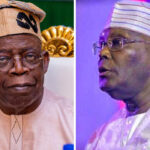

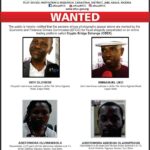
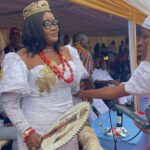

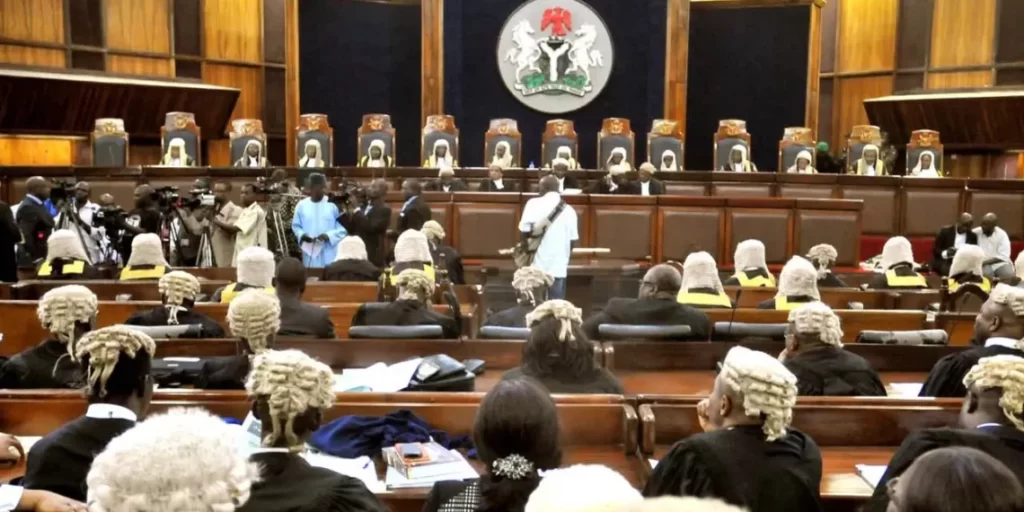
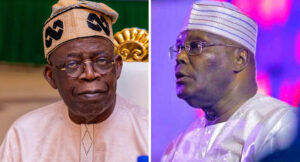

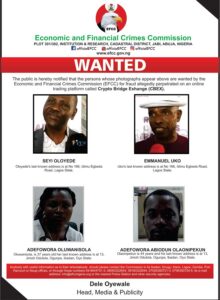
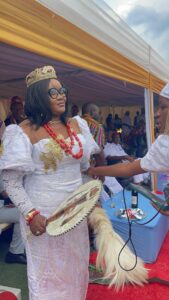
More Stories
Defections: 2027 election a choice between Nigerians and Tinubu, not PDP vs APC – Atiku
EFCC declares four Nigerians wanted in alleged N1.3 trillion CBEX fraud
Akpabio, Bianca, Kukah, others lead Nigeria’s delegation to Pope Francis funeral